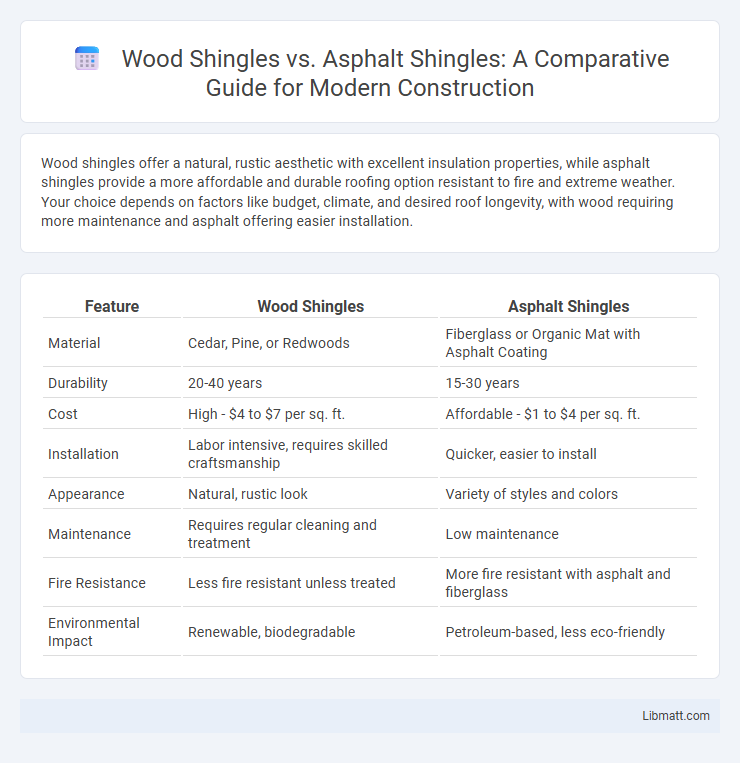Wood shingles offer a natural, rustic aesthetic with excellent insulation properties, while asphalt shingles provide a more affordable and durable roofing option resistant to fire and extreme weather. Your choice depends on factors like budget, climate, and desired roof longevity, with wood requiring more maintenance and asphalt offering easier installation.
Table of Comparison
| Feature | Wood Shingles | Asphalt Shingles |
|---|---|---|
| Material | Cedar, Pine, or Redwoods | Fiberglass or Organic Mat with Asphalt Coating |
| Durability | 20-40 years | 15-30 years |
| Cost | High - $4 to $7 per sq. ft. | Affordable - $1 to $4 per sq. ft. |
| Installation | Labor intensive, requires skilled craftsmanship | Quicker, easier to install |
| Appearance | Natural, rustic look | Variety of styles and colors |
| Maintenance | Requires regular cleaning and treatment | Low maintenance |
| Fire Resistance | Less fire resistant unless treated | More fire resistant with asphalt and fiberglass |
| Environmental Impact | Renewable, biodegradable | Petroleum-based, less eco-friendly |
Introduction to Wood Shingles vs Asphalt Shingles
Wood shingles offer a natural, rustic aesthetic made from cedar, redwood, or pine, providing excellent insulation and durability with proper maintenance. Asphalt shingles dominate the market due to their affordability, ease of installation, and wide variety of styles and colors, making them a practical choice for many homeowners. Choosing between wood shingles and asphalt shingles depends on your budget, climate, and desired roofing lifespan.
Material Composition and Characteristics
Wood shingles are typically made from cedar, redwood, or pine, offering natural insulation, durability, and an attractive, rustic appearance that weathers over time. Asphalt shingles consist of a fiberglass base coated with asphalt and mineral granules, providing water resistance, fire retardancy, and a wide range of colors with relatively low cost and ease of installation. The organic fibers in wood shingles make them more prone to rot and insect damage, whereas asphalt shingles offer increased longevity and require less maintenance.
Aesthetic Appeal and Curb Appeal
Wood shingles offer a natural, rustic aesthetic that enhances curb appeal with their unique textures and warm, earthy tones, appealing to traditional and craftsman-style homes. Asphalt shingles provide a versatile range of colors and styles that can mimic slate or wood, delivering a clean, uniform look that suits modern and suburban properties. Both materials significantly impact a home's visual appeal, with wood shingles often valued for their premium, timeless charm and asphalt shingles favored for their adaptability and cost-effectiveness.
Installation Process and Requirements
Wood shingles require skilled craftsmanship due to their precise nailing and spacing to ensure proper ventilation and water runoff, while asphalt shingles offer a more straightforward installation with fewer tools and less specialized experience. Wood shingles must be installed over an irradiated underlayment or spaced sheathing to prevent moisture retention, whereas asphalt shingles typically use a felt or synthetic underlayment for waterproofing. The installation time for wood shingles is generally longer because of manual handling and alignment, contrasted with asphalt shingles that allow faster, more uniform application on various roof shapes.
Durability and Lifespan Comparison
Wood shingles offer a natural aesthetic with a typical lifespan of 30 to 50 years when properly maintained, relying on resistance to rot and insects to enhance durability. Asphalt shingles, commonly used in residential roofing, provide a more affordable option with a lifespan of 20 to 30 years, featuring superior weather resistance against wind, hail, and UV rays. Both materials require periodic inspection, but wood shingles may need more frequent upkeep to prevent moisture damage and extend their longevity.
Weather Resistance and Performance
Wood shingles offer natural insulation and perform well in moderate climates but are susceptible to rot, mold, and fire damage without proper maintenance. Asphalt shingles provide superior weather resistance against heavy rain, wind, and UV exposure, making them more durable and low-maintenance in harsh conditions. Your choice depends on the specific climate and how much upkeep you're willing to invest for long-term performance.
Maintenance Needs and Upkeep
Wood shingles require regular maintenance such as cleaning to prevent mold, moss, and debris buildup, and periodic sealing or staining to protect against moisture and UV damage. Asphalt shingles have lower upkeep demands, needing occasional inspection and debris removal, but may require replacement sooner due to wear from weather conditions. Your choice depends on balancing the natural look and maintenance commitment of wood versus the affordability and reduced care of asphalt shingles.
Environmental Impact and Sustainability
Wood shingles offer superior environmental benefits due to their natural biodegradability and renewable sourcing from sustainably managed forests, reducing landfill waste and carbon footprint compared to asphalt shingles. Asphalt shingles, made from petroleum-based materials, contribute significantly to environmental pollution and are less recyclable, often ending up in landfills where they persist for decades. Choosing wood shingles supports sustainability goals by enhancing energy efficiency through natural insulation and minimizing the ecological impact associated with non-renewable resource extraction.
Cost Analysis and Value for Money
Wood shingles typically cost between $400 to $700 per square, offering a natural aesthetic and excellent insulation, while asphalt shingles range from $100 to $150 per square, making them a more budget-friendly option. Despite higher upfront costs, wood shingles can increase your home's value and longevity if properly maintained, whereas asphalt shingles require more frequent replacements but have lower initial expenses. Evaluating your budget alongside long-term benefits helps determine which roofing material delivers the best value for money.
Choosing the Right Shingle for Your Home
Wood shingles offer natural insulation and a classic aesthetic that enhances curb appeal, while asphalt shingles provide cost-effective durability and easier installation. Consider climate conditions, budget constraints, and maintenance requirements when selecting between wood's organic texture and asphalt's versatile color options. Evaluating the lifespan and environmental impact can guide homeowners toward the ideal roofing shingle to protect and complement their property.
Wood shingles vs asphalt shingles Infographic

 libmatt.com
libmatt.com